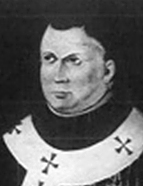

After the Vila-Francada, Friar Fortunato de São Boaventura was appointed royal censor of the Desembargo do Paço [Royal Board of Appeal], and on 5 December 1823, he became secretary of a purging board for lecturers, opponents, and university employees to be excluded for their revolutionary behaviour and opinions (Marília Favinha, Op. Cit. , pp. 23 and 135). In 1827 he was promoted to chronicler-general of the Order of St Bernard and that same year he published, once again at the Impressão Régia, the História cronológica e crítica da Real Abadia de Alcobaça, da Congregação Cisterciense de Portugal, to serve as a continuation to the illustrated Alcobaça by the Chronicler Major Frei Manuel dos Santos [Chronological and critical history of the Royal Abbey of Alcobaça, of the Cistercian Congregation of Portugal, to serve as a continuation to the illustrated Alcobaça by the Chronicler Major Frei Manuel dos Santos] with a long favourable opinion from José Agostinho de Macedo, who in a letter refers to the author as the Mabillon of the "congregation of St Bernard" (Teófilo Braga, Obras inéditas de José Agostinho de Macedo... [Unpublished works by José Agostinho de Macedo...] , vol. I, 1900, p. 92 and Joaquim Veríssimo Serrão, A Historiografia Portuguesa... [Portuguese Historiography ...] , vol. III, 1974, pp. 98 ff.). This work, however, was criticised by João Pedro Ribeiro in 1829 and 1830, at a time when he was the dean of the Portuguese Literature class at the Academy and holder of the Diplomatics chair at the Torre do Tombo. Friar Fortunato and even José Agostinho de Macedo will respond to Ribeiro's comments, marking a clear confrontation between a historiography that, while authored by a secular priest, was secularised and did not conform to the hagiographic spirit of certain monastic historiography, and a centuries-old tradition of Alcobaça scholarship, which was not free from foundational myths and undocumented legends. These myths and legends are not criticised by Ribeiro, and thus Friar Fortunato does not seem to have reproduced them uncritically; rather, he heatedly defended the merits of his predecessors in the Order, the authors of the Monarquia Lusitana [Lusitanian Monarchy] work which we know reproduces the pseudo-minutes of the Lamego courts. For example, there is discussion around the palaeographic expertise within the Cistercian congregation and its decision not to send some of its monks to the Aula Diplomática in Lisbon — a choice that Friar Fortunato attributed to economic reasons, suggesting it could be addressed through alternative means, with internal training provided by the Order. As for the origins of the donations to the monastery of Alcobaça, São Boaventura argued that placing too much emphasis on the lack of contemporary documents would lead to "historical scepticism" and reminded that "there are also very respectable historical traditions" ( Resposta às " Reflexões do conselheiro João Pedro Ribeiro" [Response to the Reflections of Counsellor João Pedro Ribeiro], 1830, pp. 3-8 ff.).
This work is financed by national funds through FCT - Foundation for Science and Technology, I.P, in the scope of the projects UIDB/04311/2020 and UIDP/04311/2020.
